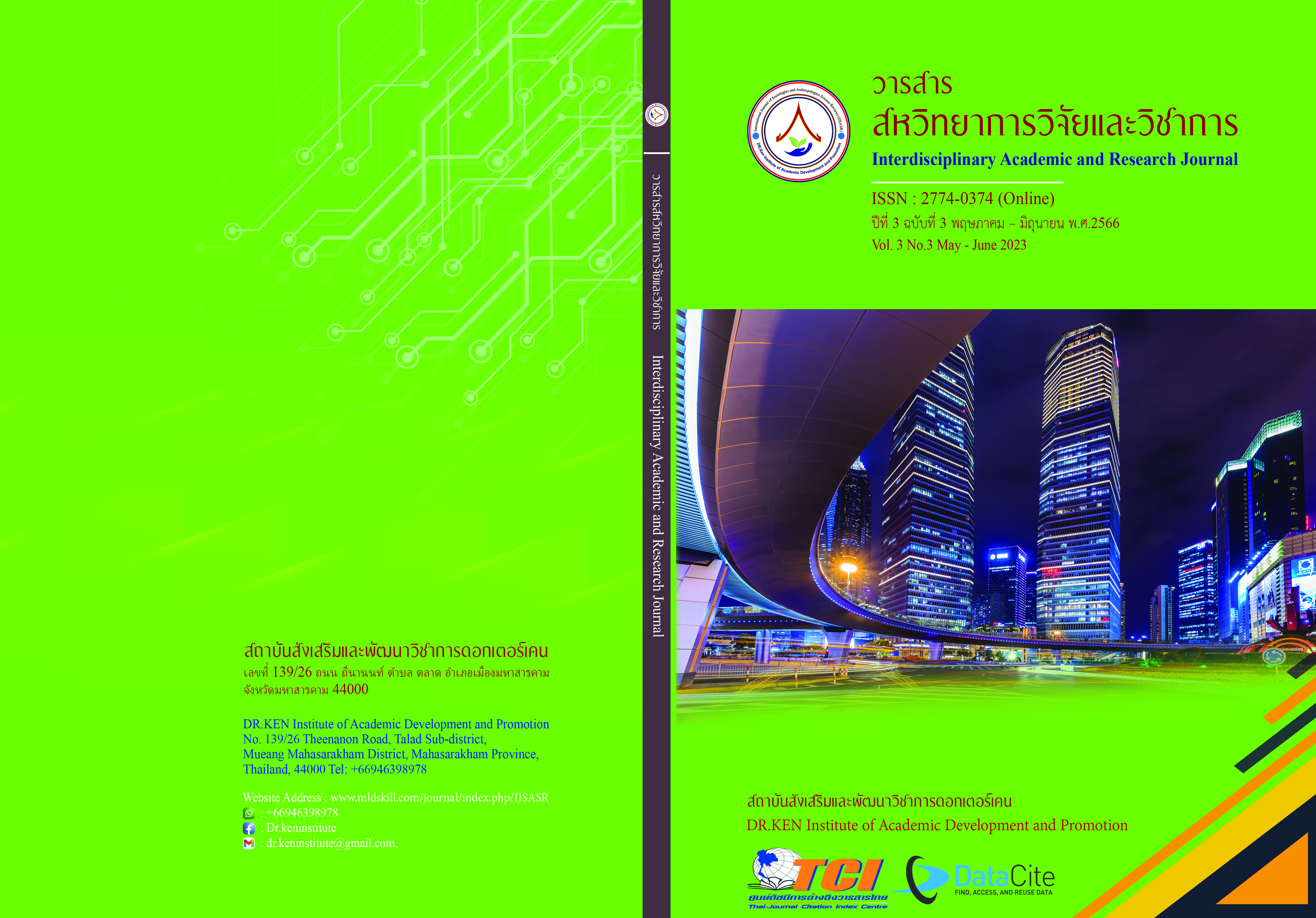The Fiscal Autonomy of Thai Local Administrative Organizations
DOI:
https://doi.org/10.14456/iarj.2023.121Keywords:
Local Administrative Organization; , Fiscal Autonomy; , DecentralizationAbstract
Decentralization of fiscal power, therefore, results in local authorities having decision-making power in managing their missions and budgets in terms of tax mechanisms and expenditure budgets that are more consistent with the context of each locality. The local government is the agency that is closest to the people and the community and plays an important role in improving the quality of life of the people in many dimensions. This research aims to the fiscal autonomy of Thai local administrative organizations Its objective is to study the fiscal autonomy of Thai local administrative organizations by considering the income structure under the Determining Plan and Process of Decentralization Act B.E.2542 (1999). The researcher uses a qualitative research approach and using content analysis. The study results found that the income of Thai local administrative organizations as a whole tends to continue to increase both in terms of amount and proportion to government revenue. But on the other hand, found the income most of them, are received from subsidies and taxes allocated by the government, totaling about 90 percent of total income. Although there is a tendency to increase every year, the proportion of local revenues collected by themselves, totals about 10 percent, reflecting the local fiscal health as a lack of fiscal autonomy, especially in the field of revenue collection.
References
กรมส่งเสริมการปกครองท้องถิ่น. (2562). ข้อมูลองค์กรปกครองส่วนท้องถิ่น. Retrieved on January 12, 2022, from: http://www.dla.go.th/work/abt/.
กรมส่งเสริมการปกครองท้องถิ่น. (2564). ข้อมูลรายได้ขององค์กรปกครองส่วนท้องถิ่น ประจำปีงบประมาณ พ.ศ. 2564. กรุงเทพฯ: กรมส่งเสริมการปกครองท้องถิ่น กระทรวงมหาดไทย.
จรัส สุวรรณมาลา. (2541). การปฏิรูปการคลังและการกระจายอำนาจสู่ภูมิภาคและท้องถิ่น. กรุงเทพฯ: สำนักกองทุนสนับสนุนการวิจัย.
ดิเรก ปัทมสิริวัฒน์. (2549). การคลังของท้องถิ่น: รวมบทความวิจัยเพื่อเพิ่มพลังให้ท้องถิ่น. กรุงเทพมหานคร: พี เอ ลีฟวิ่ง.
พระราชบัญญัติกำหนดแผนและขั้นตอนการกระจายอำนาจให้แก่องค์กรปกครองส่วนท้องถิ่น พ.ศ. 2542. (2542, 17 พฤศจิกายน). ราชกิจจานุเบกษา. เล่ม 116 ตอนที่ 114 ก. หน้า 48- 66.
ระบบข้อมูลการใช้จ่ายภาครัฐ. (2563). ที่มารายได้รวมท้องถิ่น. Retrieved on January 12, 2023 from: https://govspending.data.go.th/dashboard/7.
วีระศักดิ์ เครือเทพ. (2565). นวัตกรรมการพัฒนารายได้ท้องถิ่น: การพัฒนาตัวแบบและบทเรียนสำคัญจากการวิจัยเชิงทดลอง. วารสารปาริชาต มหาวิทยาลัยทักษิณ. 35 (1), 87-106
วุฒิสาร ตันไชย และคณะ. (2558). ข้อเสนอเชิงนโยบายนวัตกรรมการพัฒนารายได้ขององค์กรปกครองส่วนท้องถิ่น. กรุงเทพฯ: สถาบันพระปกเกล้า.
ศูนย์บริการวิชาการเศรษฐศาสตร์ มหาวิทยาลัยธรรมศาสตร์. (2552). รายงานการวิจัยเรื่องโครงการกระจายอำนาจทางการคลังเพื่อขับเคลื่อนบริการทางสังคมไปสู่องค์กรปกครองส่วนท้องถิ่น. กรุงเทพฯ: ยูนิเซฟ ประเทศไทยและสำนักงานพัฒนาการเศรษฐกิจแลสังคมแห่งชาติ.
สกนธ์ วรัญญวัฒนา. (2553). วิถีใหม่การพัฒนารายรับท้องถิ่นไทย. นนทบุรี: สถาบันพระปกเกล้า.
สำนักงานเลขาธิการสภาผู้แทนราษฎร. (2564). รายงานวิเคราะห์รายได้ขององค์กรปกครองส่วนท้องถิ่น. กรุงเทพฯ: สำนักงานเลขาธิการสภาผู้แทนราษฎร.
สำนักงานคณะกรรมการการกระจายอำนาจให้แก่องค์กรปกครองส่วนท้องถิ่น. (2556). คู่มือการกระจายอำนาจภาคประชาชน. กรุงเทพฯ: สำนักงานคณะกรรมการการกระจายอำนาจให้แก่องค์กรปกครองส่วนท้องถิ่น.
Tiebout, C.M., (1956). A Pure Theory of Local Expenditure. Journal of Political Economy. 64 (5),416-424. https://www.jstor.org/stable/1826343
Manor, J., (1999). The Political Economy of Democratic Decentralization. Washington, D.C.: World Bank.
Shah, A., (2007). PUBLIC SECTOR GOVERNANCE AND ACCOUNTABILITY SERIES PARTICIPATORY BUDGETING. Ed. Shah, A., Washington, DC: World Bank.
The Organization for Economic Co-operation and Development; OECD. (2022). Revenue Statistics 2022: The Impact of COVID-19 on OECD Tax Revenue. OECD Publishing, Paris, https://doi.org/10.1787/8a691b03-en.
World Bank. (2010). Decentralization Briefing Notes. Ed. by Jennie Litvack and Jessica Seddon. World Bank Institute.
Downloads
Published
How to Cite
Issue
Section
License
Copyright (c) 2023 Titus Mala

This work is licensed under a Creative Commons Attribution-NonCommercial-NoDerivatives 4.0 International License.
Copyright on any article in the Interdisciplinary Academic and Research Journal is retained by the author(s) under the under the Creative Commons Attribution-NonCommercial-NoDerivatives 4.0 International License. Permission to use text, content, images, etc. of publication. Any user to read, download, copy, distribute, print, search, or link to the full texts of articles, crawl them for indexing, pass them as data to software, or use them for any other lawful purpose. But do not use it for commercial use or with the intent to benefit any business.
















.png)


